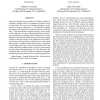Free Online Productivity Tools
i2Speak
i2Symbol
i2OCR
iTex2Img
iWeb2Print
iWeb2Shot
i2Type
iPdf2Split
iPdf2Merge
i2Bopomofo
i2Arabic
i2Style
i2Image
i2PDF
iLatex2Rtf
Sci2ools
ICASSP
2010
IEEE
2010
IEEE
Semi-Supervised Fisher Linear Discriminant (SFLD)
Supervised learning uses a training set of labeled examples to compute a classifier which is a mapping from feature vectors to class labels. The success of a learning algorithm is evaluated by its ability to generalize, i.e., to extend this mapping accurately to new data that is commonly referred to as the test data. Good generalization depends crucially on the quality of the training set. Because collecting labeled data is laborious, training sets are typically small. Furthermore, it is often difficult to represent all possible observation scenarios during training, so that the statistics of the training set end up differing from those of the test data, a problem known as the sample selection bias. To address sample selection bias, we introduce a Semi-Supervised Fisher Linear Discriminant (SFLD) that utilizes additional, unlabeled data to improve generalization for both small and biased training sets. We characterize the conditions under which SFLD helps, and illustrate its benefi...
| Added | 06 Dec 2010 |
| Updated | 06 Dec 2010 |
| Type | Conference |
| Year | 2010 |
| Where | ICASSP |
| Authors | Seda Remus, Carlo Tomasi |
Comments (0)

